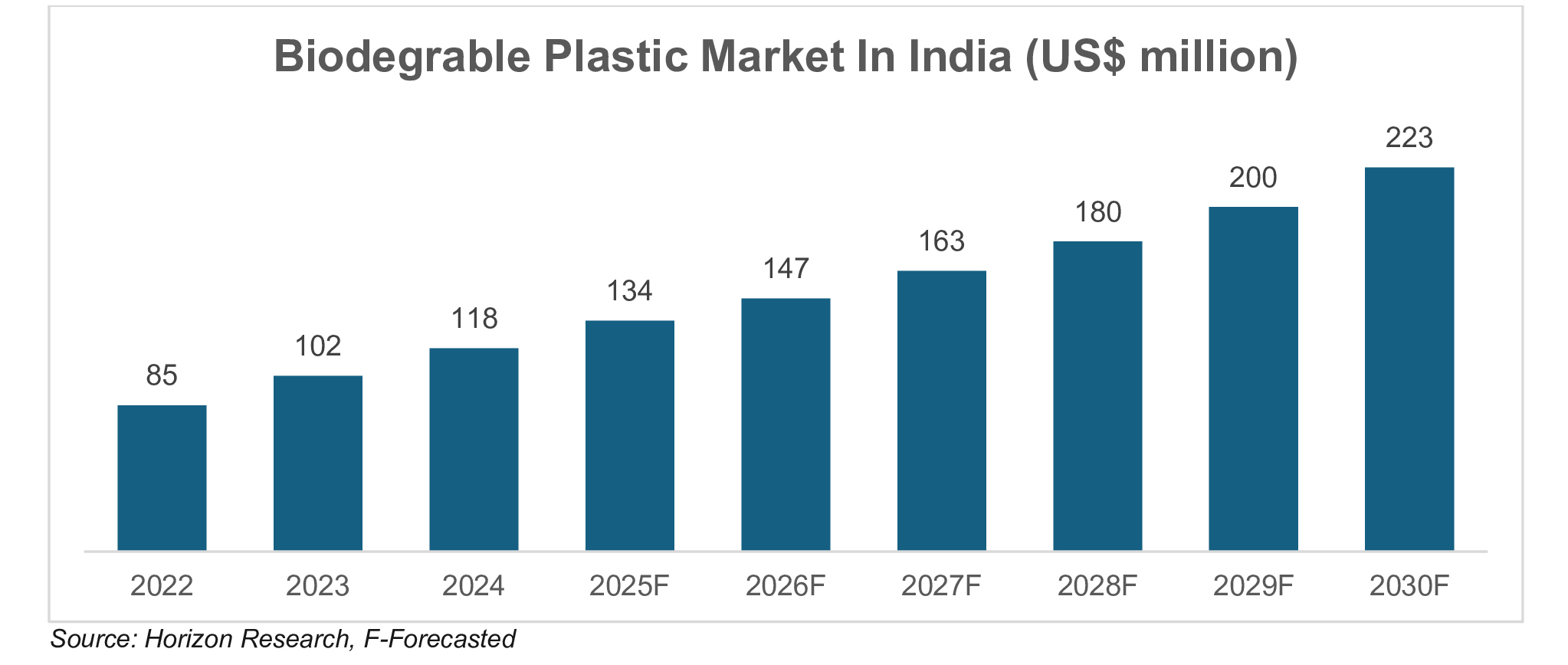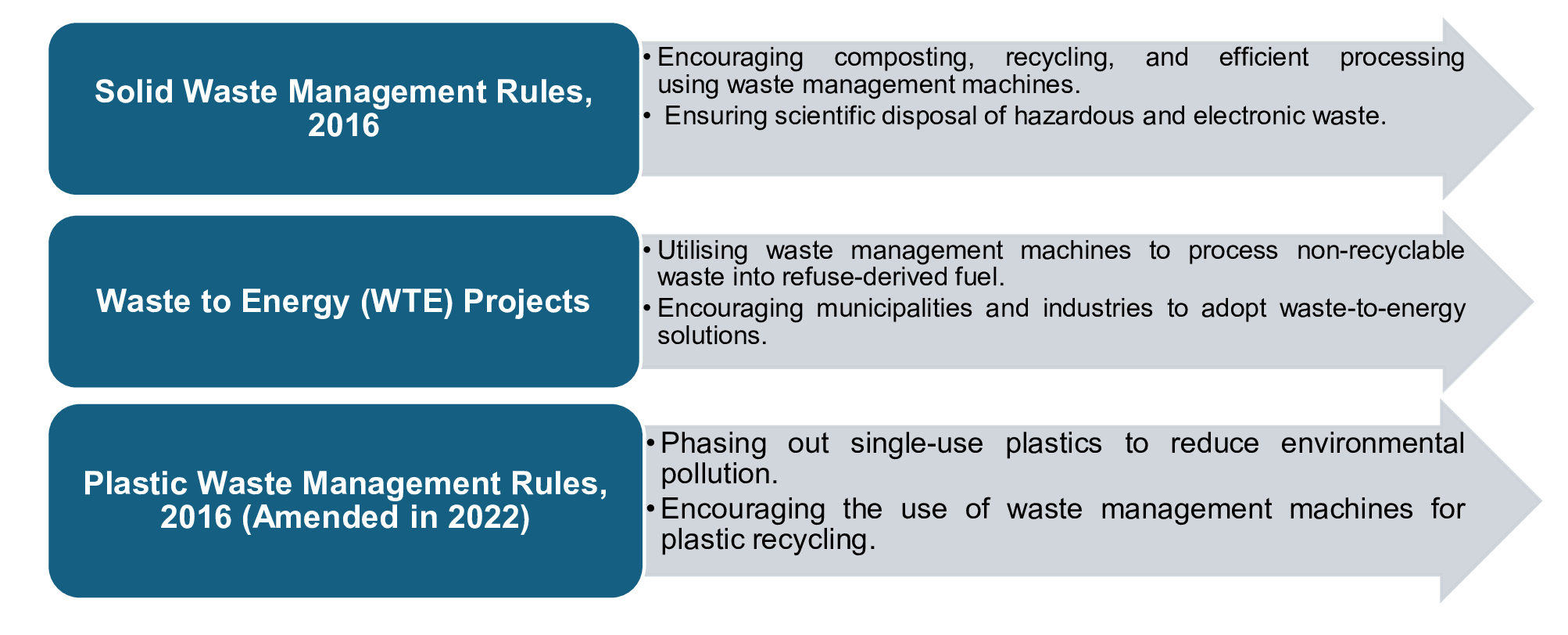SEARCH
RECENT POSTS
Categories
- Agriculture (28)
- Automobiles (18)
- Banking and Financial services (31)
- Consumer Markets (46)
- Defence (6)
- Ecommerce (20)
- Economy (66)
- Education (12)
- Engineering (6)
- Exports (21)
- Healthcare (24)
- India Inc. (8)
- Infrastructure (29)
- Manufacturing (26)
- Media and Entertainment (13)
- Micro, Small & Medium Enterprises (MSMEs) (15)
- Miscellaneous (30)
- Perspectives from India (33)
- Pharmaceuticals (4)
- Railways (4)
- Real Estate (16)
- Renewable Energy (17)
- Research and Development (8)
- Retail (1)
- Services (6)
- Startups (15)
- Technology (53)
- Textiles (6)
- Tourism (12)
- Trade (5)
India’s Eco Commitment: Curbing Plastic Use and Advancing a Greener Tomorrow

- Oct 10, 2025, 18:30
- India Inc.
- IBEF
Plastic has long been celebrated for its versatility, light weight, flexibility, toughness, and long-lasting properties. Over the past five decades, it has made its space across businesses from packaging to healthcare. However, this adaptation has come at a growing environmental cost. Global plastic generation has skyrocketed from 15 million tonnes in 1964 to around 430 million tonnes in 2022. Despite such scale, only approximately 9% of this plastic is effectively reused, whereas about 22% is mismanaged, ending up in landfills, water bodies or incinerated.
The plastic crisis is anticipated to compound, with global plastic utilisation anticipated to twofold by 2040 due to rising livelihoods, urbanisation, and moving utilisation designs. India is no exception to this worldwide trend. With over 9.4 million tonnes of plastic squander created every year, the nation is grappling with a developing environmental challenge. However, it has shown solid progress, recycling about 41% of its plastic waste. India's commitment to addressing the plastic issue positions it as a potential global pioneer in sustainable waste administration. The country’s thrust towards eco-friendly options and approach marks the starting of a pivotal shift, one that may change regular choices into long-term environment picks.
India’s global commitments and climate goals
The developing risk of plastic pollution proceeds to pose an extreme hazard to human wellbeing and biodiversity, with plastic waste presently found even in the remotest corners of the planet. In India, this crisis has provoked a solid policy response. On World Environment Day 2025, the Ministry of Environment revealed the theme ‘One Nation, One Mission: End Plastic Pollution’, fortifying the country’s commitment to controlling plastic contamination at each level.
India ranks among the global pioneers in plastic waste recycling, with a recycling rate of 41%, significantly higher than the global average of 9%. This has helped reduce the environmental damage caused by landfill dumping and open burning. The government's thrust for improved plastic waste management in India incorporates extending infrastructure, empowering extended producer responsibility (EPR), and enforcing across the country single-use plastic ban, which came into effect in July 2022.
Aligned with the United Nations’ Sustainable Development Goals (SDGs), and driven by the aspiration of building a cleaner and greener India, the nation has set strong climate targets:
- Achieving net-zero production by 2070.
- Reducing emissions intensity by 45% from 2005 levels by 2030; and
- Targeting 500 GW of renewable energy capacity by 2030.
These activities are portion of a larger vision under the Green India Mission, a pillar of India’s eco-friendly initiatives. Through the integration of environmental policies, India is not only handling the plastic issue but also supporting a culture of feasible development and way of life that complements the continuous green revolution.
Biodegradable products replacing plastic

The biodegradable plastic market in India was valued at US$ 85 million in 2022 and is expected to grow to US$ 223 million in 2030, as India escalates endeavours under the single-use plastic ban. These biodegradable items are progressively used across businesses and households. Replacing 1% of India’s single-use plastic with biodegradable options could avoid more than 20,000 tonnes of plastic waste every year, which could help in building a more feasible lifestyle in India. Some of the alternatives are:
- Adoption by food services: Over 40% of quick-service restaurants (QSRs) in Level 1 cities have transitioned to bagasse or paper-based containers to comply with single-use plastic ban regulations.
- Areca Palm Leaf Plates and Bowls: India created over 3.5 billion areca leaf plates in 2022–23, primarily from Karnataka and Kerala, helping replace an estimated 5,000 tonnes of plastic tableware annually.
- Bagasse Bundling: Made from sugarcane mash, this biodegradable fabric is replacing plastic containers in food delivery and retail packaging.
- Biodegradable Paper Mugs and Straws: Well-known in cafes and nourishment chains, decreasing reliance on plastic disposables.
These green India arrangements are crucial to building a cleaner and greener India, adjusted with broader plastic waste management endeavours and the progressing green revolution in India.
Government initiatives
With the increasing generation of plastic waste every year, the Indian government took striking measures to handle plastic contamination by executing a ban on manufacturing, selling, and utilising certain single-use plastic item, including plastic carry bags, beginning from July 1, 2022. Under India’s G20 administration in 2023, through the Lifestyles for Sustainable Development (LIFE) programme, the Indian government focused on making India cleaner and greener and highlighted the urgency of moving from perpetual utilisation of single-use plastic to eco-friendly paper or cloth bags. The government presented the Plastic Waste Management Act 2016 (revised 2022) to control plastic waste disposal and promote extended producer responsibility, which makes plastic producers responsible for collecting and recycling plastic waste. The Swachh Bharat Mission helped in engaging millions of people in sanitation and solid waste management across the nation. Other government changes focus on diminishing the use of plastic materials and providing waste management solutions, including:

The Green Push: Eco-friendly and sustainable development in India
The private sector in India collaborated with public sector units for engaging in various innovative efforts to reduce plastic pollution and promote Green India initiatives. It started with the launch of India Plastics Pact, which aims to establish the principle of an ‘Eliminate, Innovate, and Circulate’ economy for plastic packing in India. Brands such as Coca-Cola India and Amazon committed to following the pact and aiming for a greener India. Next was a strategic partnership between Australia and India focusing on developing innovative plastic waste recycling technologies under the National Circular Economy Roadmap for Reducing Plastic Waste in India.
A start-up based in Delhi, Dharaksha Ecosolutions, addressed the issue of packaging by transforming agricultural waste, which is often burnt and contributes to plastic pollution, into eco-friendly packaging solutions. The Defence Research and Development Organisation (DRDO) in collaboration with a company based in Hyderabad, developed biodegradable cutlery technology, which has helped to replace plastic spoons, plates and teacups. Ishitva Robotic System aims to improve the recycling process through automation.
Outlook
India has made quantifiable progress in addressing plastic pollution through an extend of policy changes, including the Plastic Waste Management Rules 2016 (revised 2022) and the single-use plastic ban in India. Although, the challenge remains tremendous. As per Central Pollution Control Board’s (CPCB) 2023 report, India produced roughly 9.46 million tonnes of plastic waste, of which about 43% comprised single-use plastic item. Despite growing recycling endeavours, only 43% of urban households currently practise source-level waste isolation, and the infrastructure remains uneven across districts.
In addition, India produces over 160,000 tonnes per day of civil waste; however, only 50% of it is treated, whereas 31.7% remains unaccounted for. This highlights an urgent requirement for investment in plastic waste management systems, particularly in building effective collection, sorting, and recycling offices. Reinforcing information collection and observing frameworks will play a vital part as India fastens towards fulfilling the vision of a green India, with stronger enforcement, tech-driven monitoring, and scalable eco-friendly initiatives.
FAQs
What is the single-use plastic ban in India and when was it implemented?
The single-use plastic ban in India came into effect on July 1, 2022. It prohibits the manufacture, sale, and use of select single-use plastic items to curb plastic pollution and promote a cleaner and greener India.
How is India addressing plastic waste recycling and management?
India manages over 9.4 million tonnes of plastic waste annually and recycles about 41%, one of the highest globally. The Plastic Waste Management Rules 2016 (revised 2022) and Extended Producer Responsibility (EPR) are key pillars of plastic waste management in India.
What are some eco-friendly initiatives in India replacing plastic?
Under the green revolution in India, alternatives like bagasse packaging, areca leaf tableware, and biodegradable paper straws are replacing plastic. Over 40% of QSRs in major cities now use eco-friendly containers.
How are public-private partnerships contributing to India’s plastic recycling efforts?
Initiatives like the India Plastics Pact and innovations by startups such as Dharaksha Ecosolutions and Ishitva Robotics are advancing plastic waste recycling and promoting sustainable lifestyle in India.
What are India’s long-term environmental goals?
India targets net-zero emissions by 2070, 500 GW renewable energy by 2030, and a nationwide shift to sustainable, plastic-free practices aligned with the Clean India Green India vision
















